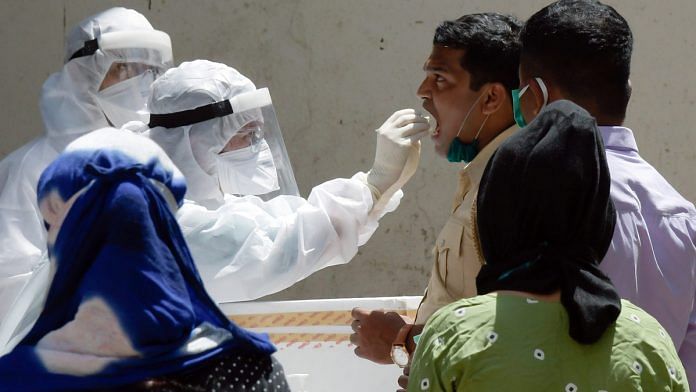New Delhi: The Centre is all set to make severe acute respiratory Infection (SARI) and Influenza-Like Illnesses (ILI) notifiable conditions as it looks to better monitoring of Covid-19 cases in the country.
Both conditions are associated with Covid-19 but can also be symptoms of other diseases such as swine flu and seasonal flu. ILI and SARI like symptoms are the bulwark of India’s current testing strategy. As the country enters monsoon, there will be a spurt in ILI cases, experts say.
Key parameters
SARI and ILI are important parameters for influenza surveillance across the world, which is why India’s testing strategy has, from the beginning, had a special focus on these kinds of patients. The World health Organization (WHO) defines ILI as “an acute respiratory infection with measured fever of ≥ 38 C° and cough that started within the last 10 days”. It says SARI is an “acute respiratory infection with history of fever or measured fever of ≥ 38 C°, cough with onset within the last 10 days and requires hospitalization”.
The notification on mandatory reporting of SARI and ILI, which is being finalised, is likely to be issued under the Epidemic Diseases Act 1897, said government sources privy to the discussions. The notification is also being prepared with an eye on long term preparedness.
“Mandatory SARI and ILI notification will give definite data and a long term mechanism of identifying any hidden transmission and be a much more robust mechanism than doing house-to-house surveys. It would be important for disease surveillance in the coming days. So states will require to notify these to the Integrated Disease Surveillance Programme (IDSP),” said a senior health ministry official.
Other diseases that are notifiable in India are tuberculosis, malaria, dengue, plague, and hepatitis among others.
Also read: Ticking ‘time bomb’: Study predicted re-emergence of ‘SARS-like virus’ 13 years ago
Testing significance
Though positive cases of Covid have to be reported to the Centre, it is not officially a notifiable disease which means, theoretically, a patient who reports Covid-like symptoms and is treated but not tested, would never be counted as a Covid-19 case, or death. Making SARI and ILI notifiable will change that.
India’s current testing strategy banks heavily on the presence of SARI or ILI-like symptoms. Among those that qualify for testing are all symptomatic (ILI symptoms) individuals with history of international travel in the last 14 days, all symptomatic contacts of laboratory confirmed cases, all symptomatic health care workers/frontline workers involved in containment and mitigation of Covid-19, all patients of SARI, all symptomatic in containment zones, hospitalised patients that develop ILI symptoms and all those among returnees or migrants with ILI symptoms. This is apart from asymptomatic contacts of patients and those that need to undergo emergency medical procedures.
Interestingly, neither SARI nor ILI are diseases in themselves; they are symptoms. The Epidemic Diseases Act on the other hand deals with diseases. That is why the notification is likely to mention the fact that these have to be monitored for the purpose of surveillance of several diseases including Covid-19.
Also read: Scientists are already fighting the next pandemic — superbugs
Mortality data
Sources also said that the National Centre for Disease Control is pushing for mandatory reporting of all deaths by the states, particularly those that happen because of respiratory diseases. This is because epidemiologists in the government believe that in a lot of states, the comorbidity is being cited as the reason for death even in Covid patients. This has been creating problems in estimating the full scale of mortality of the disease.
“There are some situations when even in a Covid positive patient, the reason for death may be something else. For example, in a person with cancer in the last stages one can put cancer as a reason. But hypertension is not something that is the cause unless there is a myocardial infarction. A person who is on antihypertensive medications for years can lead a good life. That cannot be the cause in a Covid patient. These are things that we need to examine,” said a government official.
However the official mandate of the Integrated Disease Surveillance Programme does not include monitoring of deaths. The matter of death reporting is therefore under examination, sources said.
The IDSP, which is housed on the campus of the National Centre for Disease Control, is the key to the tracking all infectious diseases in the country. It comprises a Central Surveillance Unit (CSU) and State Surveillance Units (SSU) in all State/UT head quarters and District Surveillance Units (DSU) in all districts in the country.
IDSP’s purpose is to strengthen and maintain a decentralised laboratory-based, IT-enabled disease surveillance system for epidemic prone diseases. This system will monitor disease trends and detect and respond to outbreaks in early rising phase through trained Rapid Response Team. The IDSP track about 33 diseases currently.
Also read: India’s coronavirus fight lacks the most crucial thing in its arsenal — Data



